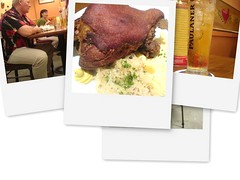Thanksgiving for Christian Friends and the Early Church in Acts
It has been an unimaginably busy few weeks. Unimaginably busy.
Though I am truly grateful for friends with whom there can be night-long discussions (without any hint of embarrassment) about the advantages of Pollini's Horowitz-like 4'50" for one of Chopin's Etudes to Ashkenazy's 5'46", I thank God even more for Christian friends who keep one somewhat fed and watered physically (who insist on swinging by at ungodly hours and days to drop off "something special" or force me to have dinner) and also spiritually, encouraging perseverance in Christ and in prayer.
And we're off to Malacca this weekend for the ARPC church camp and after there're seminars and loads of Bible studies! Excellent. Will update here when there's a bit of breathing space! :-)
Swotting overnight over the church camp Acts studies, realised that Luke's term for this friendship is koinonia; fellowship.
In Acts 2:42-47, Luke gives us an enthusiastic description of the early church:
So when we are saved, we are not just saved as individuals per se, but we are saved into a community, we are brought into a family, we become a part of the body of Christ, the covenant people of God. Says Peter:
The ἐκκλησία, the church, is a unified body that depends not on gathering in some architectural wonder/monstrosity, but in members in their several places united to the One Head - Christ, forming one organic living whole (1 Corinthians 12), making up the whole bride of Christ (Ephesians 5:25-32).
The early church was not a lukewarm meeting to which one dragged oneself out of plodding obligation and because the moving pictures and the home telly hadn't been invented.
The early church was passionate about God and about each other. They couldn't wait to spend all their time together, learning about God and sharing their meals. So in love were they with each other that they renounced not their possessions but their possessiveness over their possessions (surely the harder thing!). There was no narcissistic drive for self-fulfilment. Instead, brimming in love, they cared for each other's needs so that there were no one needy in among them.
Fellowship was not about the warm fuzzies. It was doing things for each other and caring for each other under God, guided by his word.
And evangelism was not another campaign (ie. Save People, like you would Save Water, Save Electricity, Save the Dolphins, Save Martha...) but it was the enthusiasm for God and the gospel bubbling out of the life of the believer, so happy and joyful he was that he could not but share the good news with every one he met.
This was the early church. And God added to their number daily those who were being saved.
Though I am truly grateful for friends with whom there can be night-long discussions (without any hint of embarrassment) about the advantages of Pollini's Horowitz-like 4'50" for one of Chopin's Etudes to Ashkenazy's 5'46", I thank God even more for Christian friends who keep one somewhat fed and watered physically (who insist on swinging by at ungodly hours and days to drop off "something special" or force me to have dinner) and also spiritually, encouraging perseverance in Christ and in prayer.
And we're off to Malacca this weekend for the ARPC church camp and after there're seminars and loads of Bible studies! Excellent. Will update here when there's a bit of breathing space! :-)
*************
Swotting overnight over the church camp Acts studies, realised that Luke's term for this friendship is koinonia; fellowship.
In Acts 2:42-47, Luke gives us an enthusiastic description of the early church:
They devoted themselves to the apostles' teaching and to the fellowship, to the breaking of bread and to prayer. Everyone was filled with awe, and many wonders and miraculous signs were done by the apostles. All the believers were together and had everything in common. Selling their possessions and goods, they gave to anyone as he had need. Every day they continued to meet together in the temple courts. They broke bread in their homes and ate together with glad and sincere hearts, praising God and enjoying the favor of all the people. And the Lord added to their number daily those who were being saved.and again in Acts 4:32-37:
All the believers were one in heart and mind. No one claimed that any of his possessions was his own, but they shared everything they had. With great power the apostles continued to testify to the resurrection of the Lord Jesus, and much grace was upon them all. There were no needy persons among them. For from time to time those who owned lands or houses sold them, brought the money from the sales and put it at the apostles' feet, and it was distributed to anyone as he had need.Some modern thinking encourages us to believe that we are individualists with no need of anyone else. But the gamut of soppy weepy love songs over the generations attest that we all hunger for meaningful relationships and communities of some sort. This isn't surprising considering that God designed us that way: to live not as individuals but as a community of his people.
Joseph, a Levite from Cyprus, whom the apostles called Barnabas (which means Son of Encouragement), sold a field he owned and brought the money and put it at the apostles' feet.
So when we are saved, we are not just saved as individuals per se, but we are saved into a community, we are brought into a family, we become a part of the body of Christ, the covenant people of God. Says Peter:
...you are a chosen race, a royal priesthood, a holy nation, God's own people, in order that you may proclaim the mighty acts of him who called you out of darkness into his marvelous light. Once you were not a people, but now you are God's people; once you had not received mercy, but now you have received mercy. (1 Peter 2:9-10)Augustine's pithy phrase for this was "Salus extra ecclesiam non est (Outside the church, there is no salvation)". Unfortunately, Catholic Church in the Middle Ages interpreted this as "Outside the Catholic Church, there is no salvation". What poor old Auggie apparently meant (or so his apologists tell us) was that we cannot be Christian without being automatically welded into an intimate new group of people, a new family with new brothers and sisters.
The ἐκκλησία, the church, is a unified body that depends not on gathering in some architectural wonder/monstrosity, but in members in their several places united to the One Head - Christ, forming one organic living whole (1 Corinthians 12), making up the whole bride of Christ (Ephesians 5:25-32).
The early church was not a lukewarm meeting to which one dragged oneself out of plodding obligation and because the moving pictures and the home telly hadn't been invented.
The early church was passionate about God and about each other. They couldn't wait to spend all their time together, learning about God and sharing their meals. So in love were they with each other that they renounced not their possessions but their possessiveness over their possessions (surely the harder thing!). There was no narcissistic drive for self-fulfilment. Instead, brimming in love, they cared for each other's needs so that there were no one needy in among them.
Fellowship was not about the warm fuzzies. It was doing things for each other and caring for each other under God, guided by his word.
And evangelism was not another campaign (ie. Save People, like you would Save Water, Save Electricity, Save the Dolphins, Save Martha...) but it was the enthusiasm for God and the gospel bubbling out of the life of the believer, so happy and joyful he was that he could not but share the good news with every one he met.
This was the early church. And God added to their number daily those who were being saved.
Labels: Friendship and mateship, Thanksgiving















3 Comments:
love your pics.
---------------
if you were to choose, you would rather be:
a. a Mustang
b. a joker
c. pinoy
d. the da vinci code
e. a rumor
f. good food
I also want! Where can I find friends like that?
SeE Ya aT cHurCh cAmP!!!!!!! HAH HAH HAH aRe y0u biBle LeEdr aGain? mAy bE I aM iN Y0uR gRoup!!!!!
Post a Comment
Subscribe to Post Comments [Atom]
<< Home